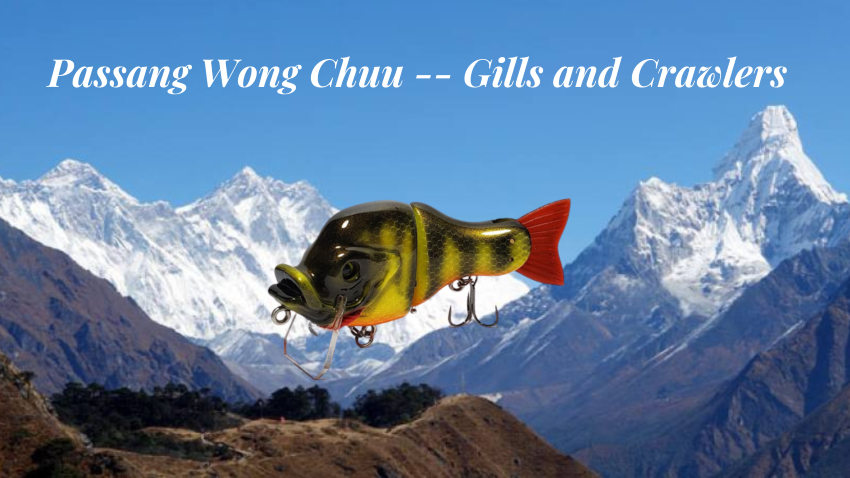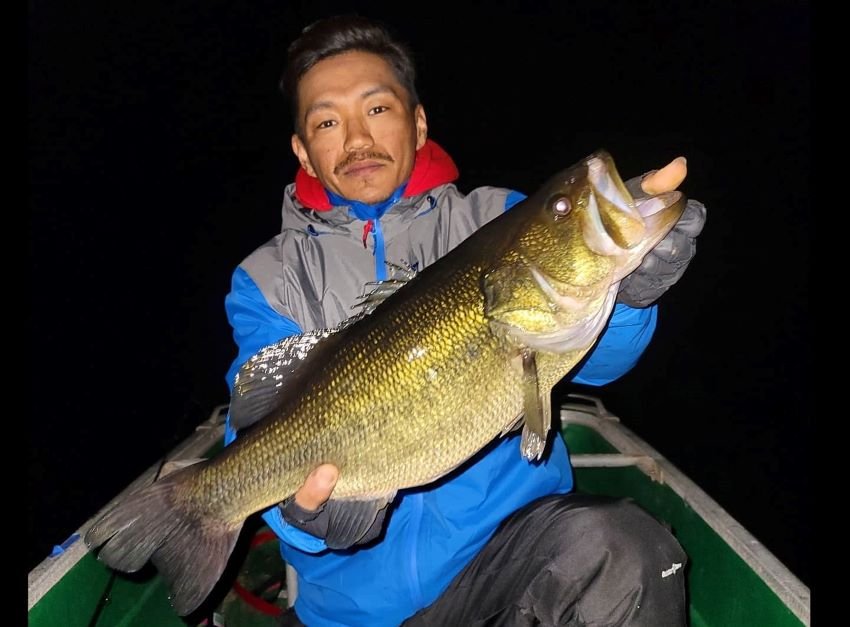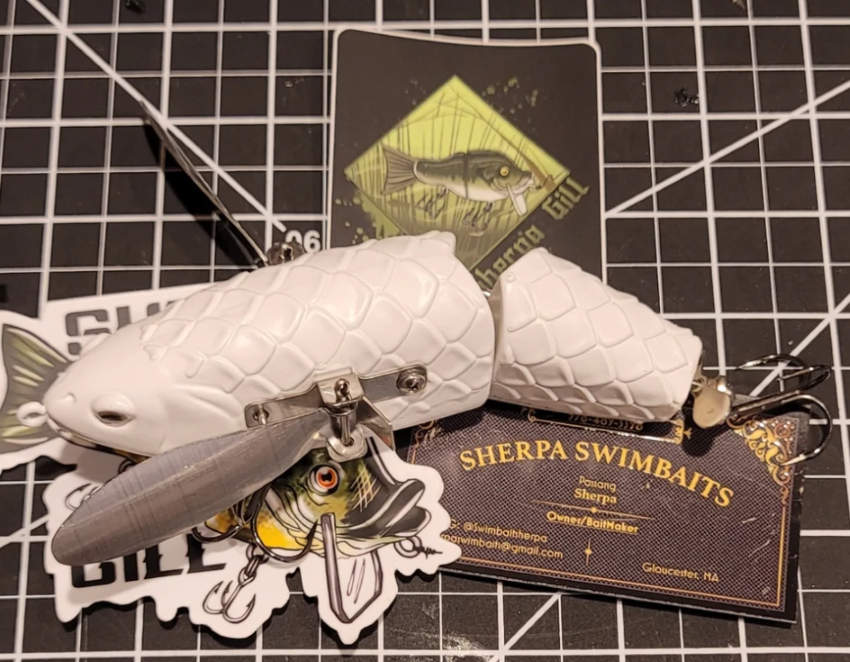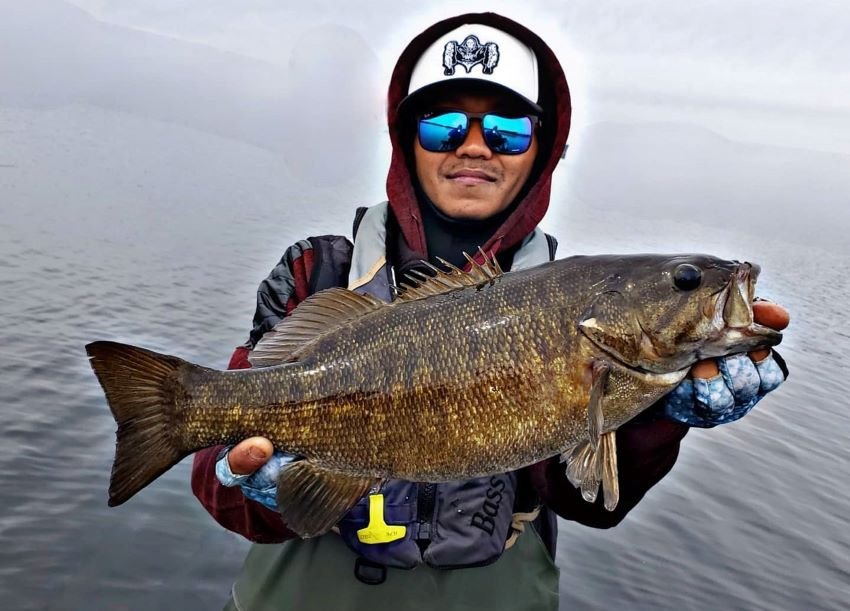A Sherpa’s Waking Dreams – From Nepal to New England
Part of the thrill of attending the Swimbait Universe Gathering was seeing the intersection of remarkable creativity with the incredible diversity within the swimbait community: from people who could afford dozens of $300 baits to guys who’d scraped that amount in change from their couch cushions to get a single Pizz; more women than I expected; and a broad range of ethnicities.
I’ve fished for bass with people from all over the globe, including both South Asia (India) and of course East Asia (Japan), but I’m not sure that I’ve ever fished with someone from Nepal, or known anyone from Nepal who was in the fishing industry. Nevertheless, before the Gathering, my friend Tej Sawhney told me that one of my first stops should be at the Sherpa Swimbaits booth, owned by Passang Wong Chuu. Hanna and I got there just in time to see some of his amazing wake gills and crawler baits fly off the table. Here’s his story, in his own words:
HPFC: Are you actually from Nepal or do you just have Nepalese heritage?
PASSANG WONG CHUU: I was born there, went to boarding school in Darjeeling, India. And I came here when I was like 10. We came to Gloucester, Mass.
HPFC: So what was the reason your family moved to Massachusetts?
PASSANG WONG CHUU: My mom was a single mom, so she came here just to look for work and kind of put me in a good school, which she did. She left me there with my grandparents and they put me in a boarding school in India. The boarding schools in Nepal were good, but education is much better at schools in India so they put me there until I was 10. The reason I came here is because my mom met my stepdad. And through him, I got my citizenship. Eventually I got naturalized just because I was under the age of 18. And my mom married my stepfather. So that's how I got here.
HPFC: It's amazing because you don't have an Asian accent or a Massachusetts accent. I would never be able to guess where you were from just talking to you over the phone.
PASSANG WONG CHUU: I get that a lot. I've heard it many times that if you try to if you learn a different language before the age of 12, you won't have an accent like your native accent.
HPFC: Is there a big Nepalese community in Gloucester?
PASSANG WONG CHUU: No, I really had a hard time growing up there and fitting in because I was different. It was a big change, big culture shock. Luckily I didn’t have a big language barrier issue because the school I went to was like a Swedish Catholic boarding school and that kids they're from like all over the place like China, Japan, Korea, like a big melting pot, and everybody had to speak English. So that's how my English was good and I could communicate.
HPFC: So how did you get into bass fishing?
PASSANG WONG CHUU: My first memory of ever fishing was when I was in boarding school. We went we took a trip to a river and we didn't have fishing poles but one of the kids there he lived in a village. His family lived in the village close by so his brother came down with a couple of makeshift fishing poles with tiny bits of bread and flour on these tiny super light wire hooks weighted with a rock, dipping it down catching these tiny, tiny little minnows. I don't know what kind of fish they were but we were catching them. That was one of my first memories. But then I got into the US. I would say that the first time I ever caught a largemouth bass would be up in New Hampshire at Echo Lake. That was just like with a family friend. We had gone there to the swamps. And it didn't really stick to me then but that'd be my first memory. Then probably when I was like, seventh or eighth grade a neighbor started showing me how to use the Zoom salamanders. And I wasn't really super into it, but we’d take many trips to Champlain with my stepdad and my mom. At the time, I was still very young. I had the drive and the passion for it, but just lacking the technique and a lot of knowledge.
HPFC: So what's the transition from being sort of a recreational family fisherman, to building baits? What makes you decide to take that leap?
PASSANG WONG CHUU: I had those seeds planted in me when I was younger. I went through high school and some college. I didn’t really do much fishing throughout, but then I kind of got back into fishing. And then I would do it here and there, but didn't really get back into until about 2017 or 2018. I started getting more into it. At that point, I would be looking at techniques, just trying to educate myself more. And from there it just kind of turned into an addiction for me. I've spent many, many, many hours on water. I've always liked creating things, whether it’s breaking a couple of my other toys do they take the motors out to build a little rubber raft with a little propeller mower, you know, just little things like that, just trinkets. So I always enjoyed doing that. And then I got into bass fishing, I got into swimbaiting and kind of wanted to bring my passion of kind of creating and making things work and integrate it into my bass fishing. I never thought that I would be selling lures in the beginning. You know, I just did it, because at the time, when I had made my bait -- there was the Psycho Gill was out, and the Wade Hoggs obviously because they're like the OG gill bait. So my bait was like right around after the Psycho Gill and the Wade Hoggs came out. There were other gill baits out on the market at the time, but the reason I made my gill bait is because while the other gill baits on the market had a very thin profile. The bait’s tall, but like doesn't have much girth to it. So I wanted something with a lot more girth, which it would move more water and displace more water and I can work it at a lot slower speeds and still maintain action, With a bait that’s a little girthier like that, the bait almost oscillate side to side, rather than if a bait is super-flat and thin it will kind of be wobbling right to left, if you know what I'm saying. So I made the first wake around 2018.
HPFC: So what's the what's the transition then from going from carving one or two to suddenly being a builder who people know?
PASSANG WONG CHUU: I never really planned it to be like, “Hey, I'm gonna make these baits and I’m going to sell them to people.” So first, I just started building because when my dad passed away in 2019, he was a master finisher, he was really good at what he does. And the plan was we’d made these wooden lures and he was going to help me out with the painting and the finishing work aspect of it because he's really good at finish work, you know? So that never happened. Instead of being lazy and complacent, which I was being about it before, I kind of, you know, got down in the basement and started working and I came up with the gill. I think it was like June 2019 I had my first prototype already casted and started heading out to the ponds that I usually go out to and fish the frogs because I knew that would be there'd be a decent bite. If they were eating a frog right off the bat outside the pad lines I figured it'd be a decent gill bite. I did not expect it but that whole summer was the best summer I've had fishing-wise. I caught a lot of big fish just on that bait. That just motivated me to do a lot more every night. I kept fishing and people saw and they messaged me they wanted a bait and eventually I had a list of people -- a couple hundred people. I did small batches, like 25 bait here and there. But then like every time I’d do a batch or catch a bunch of fish I’d have 10 or 15 people message me to put them down for one. There was a big surge of people that messaged me and asked me for a lure.
From then on I just kind of kept fishing. I never stopped fishing. Not to be selfish, but I really enjoy fishing and bait making lets me do that. I try to make the most of it whether it's for the business or for my own personal session, but either way it's a lot of time on the water,
HPFC: What inspired you to move from just the gill market and add the crawler baits, too?
PASSANG WONG CHUU: After I finished the gill and got a good amount of them out, I wanted a crawler bait because the way that my gill bait swims is very subtle. A lot of your traditional wake baits the design of the joint is usually like a V-joint, like a 45 degree cut, so the side-to-side action is not as wide and then you also have that added knock But if you look at the joint on my gill it's like two V's intersecting, opposing each other, so that gives the bait a lot wider range of movement. When you're fishing that bait really slow it's very subtle and there's no noise. I feel like that's what like triggers a lot of the big fish to eat it. A lot of these big fish are a lot a lot smarter than we think, especially by the end of the season when the water’s all beat up. I think it really takes like some finesse to get a lot of these big fish. That's why I always talk about slow waking the bait. It's almost like a dead stick. Takes a lot of patience but I’ve caught a lot of big fish doing that and I taught my friends how to do that retrieve and they've caught some personal bests. The gill bait's a stealthy, stealthy wake bait. You know, I don't ever burn it. I’m always fishing it very slow. It's a very sneaky bait for me. The reason I have the crawler is because I was missing something really loud and obnoxious in my lineup. The nights in the areas that I'd fish the gill in, sometimes you know there's fish down there but sometimes they just don’t want to eat your bait. As a bass fisherman you know you want to throw something different and the crawler was the ticket. The first year’s prototype I had so much fun with it. It was like clockwork. I just felt like I would never have a skunk night again. You know how it goes with fishing – just when you feel like you've figured it out, God just humbles you.
HPFC: It seems to me that a crawler has to be a particular tough bait to build properly, because there's so many moving parts and so much can get thrown out of whack. What are the challenges of building one that works right?
PASSANG WONG CHUU: I think they need to be very fine-tuned. And so obviously your wings need to be at the right spots. I think everybody who fishes the crawler baits should learn how to tune the wings. Learn the mechanics of how the bait works because if you educate yourself on that then you can fix it and get back on the water – you don’t have to end your day over not knowing how to retune your bait. It’s kind of like fishing braid to leader – if you want to do that, you need to know how to tie a nice splice knot, like an FG or a Crazy Alberto.
HPFC: Do you do all your own painting now or do other people do that for you?
PASSANG WONG CHUU: I like to do most of the painting. Sometimes if I don't have the time then I like to sub it out to other painters. There's a lot of guys who have a lot of talent.
HPFC: Are there particular patterns you like to paint or particular patterns you find most challenging?
PASSANG WONG CHUU: I'm still learning a lot. I really enjoy doing a bluegill pattern I do -- it takes a lot of time but it's just very satisfying as I get towards the end, doing the last detail touches on it.
HPFC: Do you fish exclusively with your own lures or do you also fish with other people's swim baits and wakes?
PASSANG WONG CHUU: Since 2019 and then in 2020 and a little bit of 2021, for hard baits all I did was fish my gill. Throughout those years I had like some really good numbers on the gill. just literally putting in a lot of time with that bait. I was also targeting a lot of shallow water. I wouldn’t be fishing my gill in a body of water that has like a lot of deep water deep water. Pretty much I was fishing places that were under 15 feet. There’s a pretty good wake bite in those shallower ponds if you can figure them out and rotate places around. That's what I did the last few years but I’m actually going up north now. The fisheries and just the dynamics of the bodies of water is just completely different. You’ve got glacial lakes up there that have offshore bait balls and all different types of forage. The dynamics are completely different. That’s another reason why I brought that crawler out. The areas I was fishing were a lot different than fishing a four foot deep slop pond.
HPFC: So you were forced to fish with other people's products at some point or another?
PASSANG WONG CHUU: Oh, of course yeah. So what I would do is in the springtime I would fish the gill wakes like at nighttime, every single night, and then pretty much same thing into the summer. In the summertime it's a little different. I would from like 2am into the morning and this is where it comes into fishing other people's baits. I don't really fish other people's hard bait but I do like fishing soft baits and all my spare time that's what I would do. Instead of going out going out with another gill wake I would go do some offshore fishing. I got lucky enough that I had one of my friends take me under his wing and show me a few things. We fished a lot, got to spend a lot of time on the water together and he showed me a lot about offshore fishing. We just fished a lot of big soft baits, Savage Gear, seven inch paddle tails, Hudds, even conventional techniques. Offshore fishing is very fascinating to me and this year I put a lot of time into that. Right after September, right after the crowds pretty much died out up in New Hampshire, I went offshore and I got the biggest bag in my whole life from one day, all on conventional baits. The fish up there so keyed in on small bait, especially in the fall. I couldn't get a bite on any big swims. These fish would follow a bait right back to the boat and then just go on back down. Then You throw something that matches the hatch and you’re just sticking them every five or six casts.
HPFC: What does the name Sherpa mean to you? Why was it important to you to distinguish yourself with that bait company name?
PASSANG WONG CHUU: Sherpa is my last name. It is my people. I was born in Namche Bazaar, 14,000 feet above sea level. A community of Sherpa people live there. My family's from there. And that's where I was born.
HPFC: Do people ever question what it means?
PASSANG WONG CHUU: Yeah, people ask me. I educate them. And that's another reason why I used the name, as a kind of way to educate other people about my culture. You need to go to Nepal.
HPFC: Why is New England such a hotbed for big bait builders? When I went to The Gathering, I was shocked at how many of you guys are from Massachusetts, New Hampshire, Vermont, those places.
PASSANG WONG CHUU: You noticed that, huh? Yes, there’s a huge community of swimbaiters in New England. It only seems to keep growing. Also the whole market. There's a lot of new baits on the market, a lot of new builders. The whole community is growing.
HPFC: What does the swimbait community mean to you? To me, it just seems so diverse and everyone seems excited by it. You go to a regular fishing show and people sometimes it seems like they're going through the motions -- but everyone at the Gatherings seemed just thrilled to be there.
PASSANG WONG CHUU: It's awesome. Also, we have groups like Swimbait Universe on Instagram there's Gus Torrealba. But he does Swimbait Culture and he does like great events -- he raises money for kids autistic kids. That's just one thing that kind of brings the community together. Another thing is Swimbait Universe – you’ve got a melting pot of 30,000 people. All these guys talk to each other. They're from different states, but they all have one thing in common: They want to catch fish. They all like fishing. So I think why you saw that excitement was because a lot of these guys are used to talking to each other through the phone or through a message. But to be able to put a face to that name, it's pretty nice. It was for me. I got to meet so many people that I was just talking to on Facebook for years.
HPFC: So what are your personal or your professional goals going forward with this? Do you expect that Sherpa swimbaits will one day sell 100,000 baits a year? Do you want to develop five new baits a year? Where do you see this company in two years or five years or 10 years?
PASSANG WONG CHUU: I mean I'm not really doing it for the money. I have I have some plans in store. I can't really elaborate too much on it right here, but I'm not going anywhere that's for sure.
HPFC: What makes you happy? Is it hearing that someone caught a 10- pounder on your bait or that someone caught their first Gill fish? What is it that that you say this this makes it all worth it if it's not the money?
PASSANG WONG CHUU: Honestly, people just having fun going out fishing using my baits, that makes me really happy. Honestly, the guy that caught the 10-pounder is no different than the person that the first time they fished my bait maybe they caught a 3-pounder. They're both happy. I get messages like that all the time. Sometimes I'm having a bad day I get like I get a couple of messages and my whole day just turned around. I really enjoy trying to help other people become better at fishing my baits. If I see somebody that is really putting in time with a bait then I'll actually reach out to them and see if they want to try a couple of places. I've done that before with some success and I’ve done that and not caught any fish -- but regardless, I enjoy it, and I think the people do, too.










